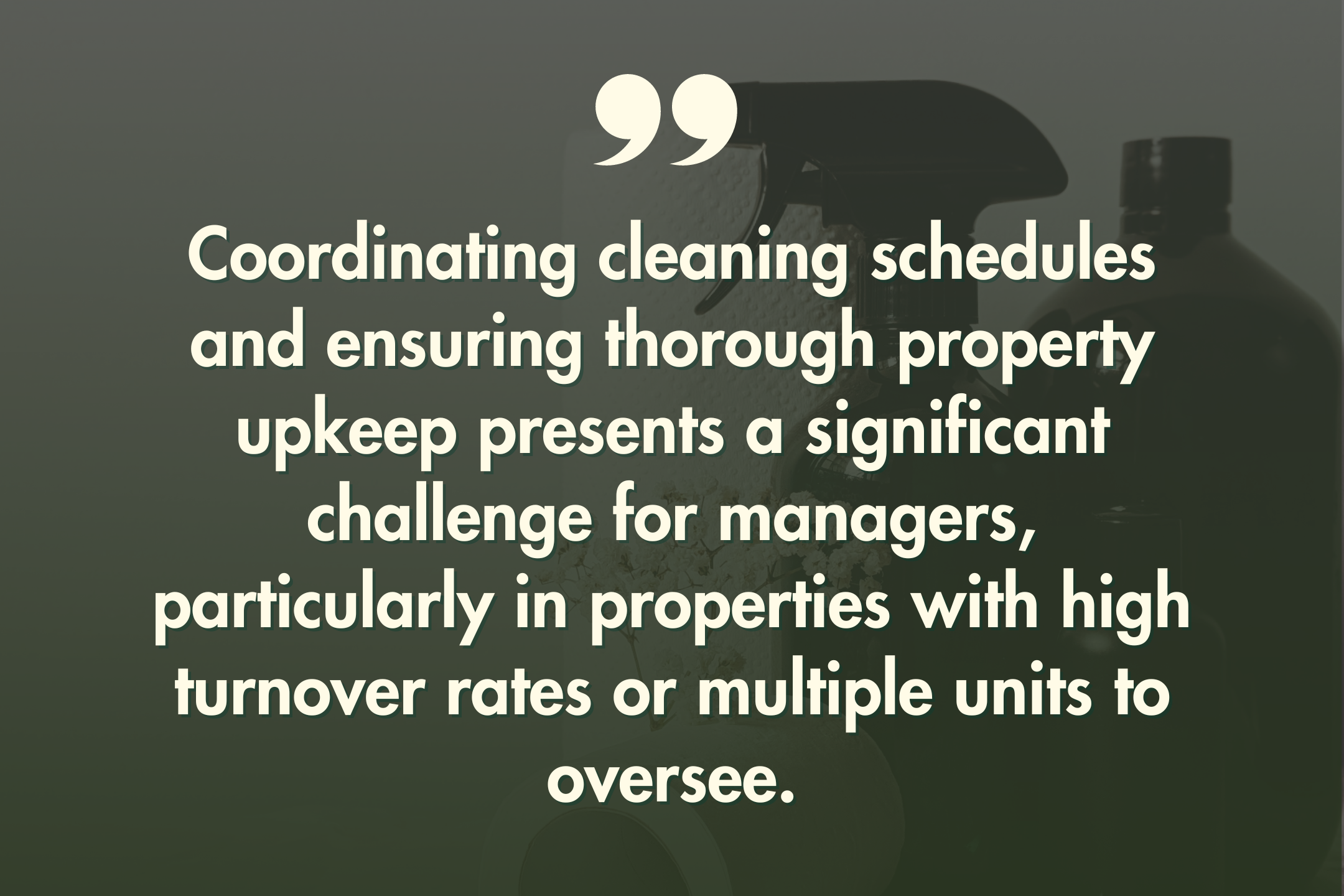
Introduction
With Airbnb alone boasting over 6 million active listings this year, the realm of short-term rentals demands proactive measures from proprietors to sustain thriving businesses. The allure of vacation rentals surges unabated, with the industry poised to soar to a projected $20 billion in revenue in the United States by 2025. In the face of this burgeoning landscape, property managers confront mounting pressures to uphold competitiveness.
The operation of a short-term rental enterprise presents its share of hurdles, yet it also offers the promise of substantial returns. From the ongoing tasks of maintenance, cleaning, and fine-tuning listings to the intricate art of guest communication and the specter of double bookings, the workload can indeed appear formidable. Nevertheless, the potential for lucrative returns renders these challenges ripe for overcoming.
Efficient Guest Communication

The age-old wisdom rings true: communication is the cornerstone of any successful interaction. Swift, affirmative, and forward-thinking engagement with guests is the key to securing stellar reviews. To tackle this challenge head-on, the integration of technology solutions that streamline communication is a viable strategy. For example, the deployment of chatbots or automated messaging systems can ensure timely responses to guest inquiries, transcending the constraints of traditional business hours. These digital tools are capable of providing guests with immediate responses to frequently asked questions or efficiently redirecting them to the relevant department for further assistance.
Moreover, these automated systems can be programmed to offer personalized responses based on the guest’s preferences, enhancing the overall guest experience. They can also handle multiple inquiries simultaneously, increasing efficiency and reducing the response time. This not only improves the guest’s perception of the service but also frees up staff time to focus on other critical tasks. By embracing such technology, businesses can foster a culture of prompt and effective communication, which is instrumental in building a positive reputation and achieving customer satisfaction. In the ever-evolving digital age, leveraging such tools is no longer an option but a necessity for maintaining a competitive edge.
In essence, effective guest communication necessitates a blend of technology, streamlined procedures, and personalized interactions in a short-term rental.
Prioritizing promptness, adaptability, and proactive communication empowers property managers to craft memorable experiences, leading to contented guests and positive feedback.
Additionally, offering guests multiple communication channels—such as email, phone, and messaging apps—caters to diverse preferences, amplifying the overall guest experience and amplifying the likelihood of favorable reviews and repeat bookings.
Furthermore, cultivating a culture of communication within the property management team is essential for seamless operations. Regular team meetings, training sessions, and feedback mechanisms facilitate open dialogue and foster a collaborative environment. This ensures that all staff members are aligned with the property’s communication protocols and are equipped to deliver exceptional service to guests.
Additionally, monitoring guest feedback and sentiment through review platforms and surveys provides valuable insights into areas for improvement. Property managers can use this feedback to refine their communication strategies and address any issues promptly, demonstrating their commitment to guest satisfaction.
Lastly, maintaining a proactive approach to communication involves anticipating guest needs and addressing potential concerns before they arise. This proactive stance not only enhances the guest experience but also minimizes the likelihood of negative reviews or complaints. By staying ahead of guest expectations and delivering exceptional service at every touchpoint, property managers can set themselves apart in the competitive short-term rental market.
Dynamic Pricing
Setting the right rental price is a fine art, requiring a delicate balance. Managers must navigate fluctuating factors such as seasonality, local demand, and property attributes to determine optimal rates. Constant adaptation to market conditions is essential to remain competitive, making pricing strategies an ongoing concern.

Seasonality plays a significant role in shaping rental prices, with demand surging during peak periods like holidays and special events. During these times, managers can capitalize on heightened demand by adjusting prices accordingly. Conversely, in off-peak seasons, they may need to offer discounts or incentives to attract guests and maintain occupancy rates.
Local demand dynamics further complicate the pricing puzzle.
Various factors including tourism trends, economic conditions, and the presence of competing accommodations all impact the demand for rental properties in a specific area. Staying attuned to these fluctuations enables property managers to adapt their pricing strategies accordingly, ensuring competitiveness within the market.
Furthermore, the unique characteristics of each property play a pivotal role in determining its rental value. Considerations such as location, size, amenities, and overall quality all contribute to the perceived value of a property in the eyes of potential guests. For instance, a property situated near popular attractions or equipped with desirable amenities like a pool or ocean view may command higher rates compared to similar properties lacking such features.
Additionally, market research and analysis are indispensable tools for property managers seeking to establish optimal pricing strategies. By assessing market trends, benchmarking against competitors, and leveraging data analytics, managers can make informed decisions regarding pricing adjustments to maximize profitability while remaining competitive.
Moreover, flexibility is key in navigating the dynamic landscape of rental pricing. Property managers should be prepared to adapt their pricing strategies in response to changing market conditions, guest preferences, and other external factors. Embracing a dynamic pricing approach that takes into account real-time demand and supply dynamics can help managers optimize revenue and maximize occupancy throughout the year.
In summary, effective pricing strategies in the short-term rental market require a multifaceted approach that considers seasonality, local demand dynamics, property attributes, market research, and flexibility. By carefully balancing these factors and leveraging technology and data-driven insights, property managers can optimize rental prices to maximize revenue while delivering value to guests.
Maintenance and Cleaning
In today’s post-pandemic landscape, the importance of maintaining impeccable cleanliness and hygiene standards cannot be overstated. With heightened concerns about health and safety, guests now place greater emphasis on the cleanliness of accommodations when making travel decisions. As a result, property managers face increased pressure to uphold rigorous cleaning protocols and ensure that their properties are pristine at all times.

Coordinating cleaning schedules and ensuring meticulous property upkeep pose formidable challenges for managers, especially in properties characterized by high turnover rates or a large number of units under their supervision. Striking a delicate balance between efficiently managing cleaning tasks and upholding impeccable cleanliness standards requires meticulous planning and execution. This entails meticulously scheduling cleaning staff, allocating adequate time for comprehensive cleaning and disinfection, and closely monitoring the cleanliness of each property to maintain guest satisfaction.
The introduction of enhanced cleaning protocols adds another layer of complexity to the task.
Property managers must remain vigilant in staying updated on evolving guidelines and recommendations from health authorities regarding cleaning procedures. This necessitates the adoption of specific cleaning products endorsed for their efficacy against viruses and bacteria, implementing more frequent cleaning of high-touch surfaces, and ensuring proper ventilation to enhance indoor air quality and guest safety.
Moreover, the challenge of coordinating cleaning efforts is compounded by the need to manage resources efficiently while ensuring compliance with budgetary constraints. Property managers must strike a balance between optimizing cleaning schedules to minimize downtime between guest turnovers and controlling operational costs. This requires careful planning, effective resource allocation, and leveraging technology to streamline cleaning processes and maximize productivity.
Additionally, maintaining consistent cleanliness across multiple properties or units within a complex presents logistical challenges for property managers. Standardizing cleaning procedures, providing comprehensive training for cleaning staff, and implementing quality assurance measures are essential strategies to uphold cleanliness standards and deliver a positive guest experience consistently.
Furthermore, proactive maintenance practices play a crucial role in preserving property condition and minimizing the need for extensive cleaning interventions. Regular inspections, timely repairs, and preventive maintenance measures help address minor issues before they escalate, ensuring that properties remain in optimal condition and reducing the workload associated with cleaning and upkeep.
In summary, effective coordination of cleaning schedules and adherence to enhanced cleaning protocols are vital for property managers to maintain cleanliness standards, uphold guest satisfaction, and ensure a safe and comfortable environment for guests. By implementing efficient cleaning practices, staying informed about industry best practices, and prioritizing proactive maintenance, property managers can navigate the challenges of property upkeep successfully.
Preventing Double Bookings
Double bookings are a nightmare scenario for any rental operation, capable of causing significant damage to reputation and eroding customer trust. Whether stemming from oversight, miscommunication, or sheer mismanagement, the fallout from double bookings can be severe and far-reaching. This scenario occurs when two or more guests are mistakenly assigned to the same property for overlapping dates, leading to confusion, frustration, and disappointment.

The ramifications of double bookings extend far beyond mere inconvenience, often resulting in guests arriving to find their accommodation already occupied or being forced to hastily relocate to alternative, potentially inferior lodgings. Such scenarios can lead to dissatisfied guests, negative reviews, and a tarnished reputation for the property, ultimately deterring future bookings. Moreover, the financial repercussions can be substantial, encompassing costs such as refunds, compensation for inconvenienced guests, and damage to brand credibility, highlighting the critical importance of effective booking management.
Manual booking management leaves ample room for error, as it heavily relies on human oversight and coordination. Even the most diligent property managers may struggle when handling multiple bookings across various channels without the assistance of automated systems. This underscores the pressing need for robust management systems capable of efficiently mitigating the risks associated with double bookings.
The implementation of a comprehensive property management system (PMS) offers a viable solution to minimizing the occurrence of double bookings.
By centralizing booking information, automating reservation processes, and providing real-time availability updates, a PMS significantly reduces the likelihood of overlapping reservations. Streamlining booking management tasks and eliminating manual data entry errors, a PMS ensures accuracy and consistency in booking assignments, thereby enhancing operational efficiency and guest satisfaction.
Furthermore, integrating a PMS with channel management platforms enables seamless synchronization of booking data across multiple distribution channels, such as online travel agencies (OTAs) and direct booking websites. This synchronization ensures that inventory availability is accurately reflected across all channels in real time, reducing the risk of overbooking and enhancing revenue optimization opportunities.
In summary, the adoption of a comprehensive property management system not only mitigates the risks associated with double bookings but also enhances operational efficiency, guest satisfaction, and overall profitability. By investing in advanced technology solutions, property managers can streamline booking processes, minimize errors, and cultivate a seamless guest experience, ultimately positioning their properties for sustained success in the competitive short-term rental market.
Listing Optimization Across Platforms
Expanding visibility and increasing bookings through diversification of listing platforms is a savvy strategy for rental property managers. However, while this approach offers the potential for greater exposure to a broader audience, it also introduces a layer of complexity to the management process. Effectively managing multiple listings across various platforms requires careful planning, organization, and attention to detail.
Crafting compelling listings that stand out amidst the sea of options available to potential guests is paramount to success in a competitive market.
Each listing must be meticulously curated to showcase the unique features and amenities of the property, enticing potential guests to book their stay. This involves not only selecting professional-quality imagery that highlights the property’s best attributes but also crafting tailored descriptions that capture the essence of the experience it offers.

Maintaining consistency in branding and messaging across all listing platforms is paramount for establishing a cohesive and professional presence in the highly competitive short-term rental market. From the tone of voice used in property descriptions to the style of photography employed, every aspect of the listing should align with the property’s unique brand identity and resonate with its target audience.
However, achieving this level of consistency while managing multiple listings across various platforms can be a daunting task. Property managers must navigate the nuances of each platform’s listing requirements, ensuring that all pertinent information is accurately presented and kept up-to-date. This encompasses details such as pricing, availability, amenities, house rules, and booking policies, which may differ from one platform to another.
Moreover, effective listing management extends beyond merely inputting information; it requires ongoing monitoring and optimization to maximize visibility and engagement. Property managers must regularly review and update listings to reflect any changes in property details or market dynamics, as well as to capitalize on seasonal trends and promotional opportunities.
Furthermore, leveraging data analytics and performance metrics can provide valuable insights into the effectiveness of listing strategies and help identify areas for improvement. By tracking key metrics such as conversion rates, booking inquiries, and guest feedback, property managers can refine their listing content and marketing tactics to enhance overall performance and drive greater success.
In summary, maintaining consistency and accuracy across multiple listing platforms while optimizing performance requires careful attention to detail, ongoing monitoring, and strategic adaptation. By aligning listing content with the property’s brand identity, staying abreast of platform requirements, and leveraging data-driven insights, property managers can enhance their online presence, attract more guests, and ultimately achieve greater success in the short-term rental market.
Conclusion
In conclusion, short-term rental property managers encounter a diverse array of challenges within today’s dynamic market landscape. Nevertheless, by embracing proactive strategies and harnessing the power of technology, these challenges can be effectively navigated, leading to sustained success and profitability.
At Otium Rentals, we understand the complexities and demands of managing short-term rental properties. Our comprehensive suite of property management solutions is designed to streamline operations, enhance guest experiences, and drive revenue growth. By leveraging our expertise and cutting-edge technology, property managers can overcome obstacles with confidence, secure in the knowledge that they have a trusted partner supporting their success.
With Otium Rentals, property managers gain access to innovative tools and resources that empower them to optimize every aspect of their rental business. From automated booking management systems to personalized guest communication platforms, our solutions are tailored to meet the unique needs of modern property managers. By partnering with Otium Rentals, property managers can unlock their full potential and achieve their goals in the competitive short-term rental market.
In essence, Otium Rentals is more than just a service provider; we are a strategic ally committed to helping property managers thrive in today’s ever-evolving rental landscape. Join us in redefining the future of short-term rental management and embark on a journey towards unparalleled success.
What are short term rentals?
Short term rentals refer to properties that are leased out for a brief period, typically less than 30 days. These rentals cater to individuals seeking temporary accommodation, often for vacations, business trips, or short-term stays in a particular area. Unlike long-term leases, short term rentals offer flexibility and convenience for both property owners and tenants.
1. Short term rentals are typically leased for less than 30 days.
2. They are popular for vacations, business trips, and short stays.
3. Short term rentals offer flexibility and convenience.
How can property managers maximize short term rental revenue?
Property managers can maximize short term rental revenue by optimizing pricing strategies, enhancing property presentation, and leveraging marketing channels effectively. Implementing dynamic pricing algorithms can ensure competitive rates based on demand fluctuations. Additionally, investing in high-quality furnishings, amenities, and maintenance can enhance the overall guest experience, leading to positive reviews and repeat bookings. Utilizing online booking platforms, social media advertising, and partnerships with local businesses can expand visibility and attract a steady stream of guests.
1. Implement dynamic pricing strategies based on demand.
2. Enhance property presentation and amenities for a better guest experience.
3. Utilize online booking platforms and marketing channels effectively.
What regulations should property managers be aware of when managing short term rentals?
Property managers should be aware of local regulations governing short term rentals, including zoning laws, tax requirements, and licensing obligations. Some cities and municipalities impose restrictions or require permits for short term rental operations to ensure compliance with safety standards and community guidelines. It’s crucial for property managers to research and understand these regulations to avoid potential legal issues and penalties.
1. Research local zoning laws, tax requirements, and licensing obligations.
2. Some cities impose restrictions or require permits for short term rentals.
3. Compliance with regulations is essential to avoid legal issues and penalties.
How can property managers ensure the safety and security of short term rental properties?
Property managers can ensure the safety and security of short term rental properties by implementing comprehensive screening procedures for guests, installing security measures such as locks, alarms, and surveillance cameras, and establishing clear emergency protocols. Conducting background checks and verifying guest identities can help mitigate the risk of undesirable incidents. Moreover, regular maintenance inspections and prompt response to maintenance requests can address potential safety hazards and maintain property standards.
1. Implement comprehensive guest screening procedures.
2. Install security measures such as locks, alarms, and surveillance cameras.
3. Conduct regular maintenance inspections and respond promptly to maintenance requests.
What are the benefits of hiring a property management company for short term rentals?
Hiring a property management company for short term rentals offers various benefits, including professional expertise, time savings, and increased rental revenue. Property management companies have the knowledge and experience to handle marketing, guest communication, property maintenance, and financial management efficiently. By outsourcing these tasks to professionals, property owners can free up their time and focus on other priorities while ensuring their rental properties are managed effectively to maximize profitability.
1. Professional expertise in marketing, guest communication, and property maintenance.
2. Time savings for property owners by outsourcing management tasks.
3. Increased rental revenue through efficient management practices.

